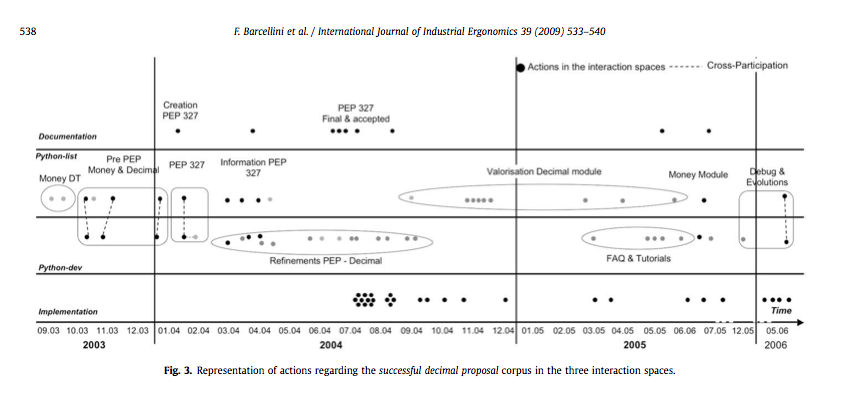Participation in online interaction spaces: Design-use mediation in an Open Source Software community
Citation: Flore Barcellini, Françoise Détienne, Jean-Marie Burkhardt (2009) Participation in online interaction spaces: Design-use mediation in an Open Source Software community. International Journal of Industrial Ergonomics (RSS)
DOI (original publisher): 10.1016/j.ergon.2008.10.013
Semantic Scholar (metadata): 10.1016/j.ergon.2008.10.013
Sci-Hub (fulltext): 10.1016/j.ergon.2008.10.013
Internet Archive Scholar (search for fulltext): Participation in online interaction spaces: Design-use mediation in an Open Source Software community
Tagged: Design-use mediation (RSS), open source (RSS), Open source software (RSS), Online community (RSS), Distributed participatory design (RSS), boundary spanners (RSS), asynchronous collaboration (RSS), design rationale (RSS), mailing lists (RSS)
Summary
An ongoing theme of Barcellini's research is the analysis of the design processes of open source software, using the artifacts of the design process itself. Those artifacts are classified into three types of spaces:
- discussions
- documentation
- implementations
Barcellini urges use of all three of these types of artefacts.
The hypothesis here is that "successful design-use mediation may be supported by boundary spanner roles emerging from interactions between users and developers". Findings support the hypothesis: " cross-participants seem to be key participants fostering the design process in the successful attempt, being the most involved and guaranteeing the follow-up of the design process". Furthermore, in this case the cross-participants had background & memory about design history and design rationale from unsuccessful proposals which may also be helpful.
The methodology is a structural analysis of publically-available information from the Python community, supplemented by email interviews with two key participants. Data relating to the introduction of a decimal type in Python (covering the period from May 2001 to May 2006) was selected by hand. Listserv posts (from a user-oriented list and a developer-oriented list) were classified into two corpora, depending on whether they concerned unsuccessful attempts or, finally, the successful one. Documentation and implementation of the decimal.py module were also studied.
Three important roles are distinguished:
- "boundary spanners", who mediate between users and developers
- "common participants", who may participate in discussions on both the user-oriented and developer-oriented lists
- "cross-participants", who discuss the same topic on both mailing lists at the same time; cross-discussion is found to be
For this study, "boundary spanners" as the "common participants" who post on both user and developer mailing lists.
The paper mentions several organisational themes
- the global organization of discussions
- the design-step organization
- the temporal delay among discussions
- the presence of same-topic parallel discussions
Features of successful proposals
- More followup and quicker followup - "the mean temporal delay among following discussions is about 30 days in the successful proposal corpus and 63 in the unsuccessful one."
- "more participants involved in the successful proposal"
- especially important are the occasional participants
- however "the successful proposal is characterized by cross-participants who appear to be mostly regular in their participation."
- a greater number and larger percentage of common participants than unsuccessful proposals
- more cross-participants
- "the involvement of the Project Leader is stronger in the unsuccessful proposals corpus than in the successful one."
- cross-participant support in documentation and implementation spaces is less evident, in part due to private exchanges and division of labor.
Visualizations provided by this study are particularly useful. (There is also a visualization of the unsuccessful proposals.)

Theoretical and Practical Relevance
This study may provide insight to contributors to open source projects about the characteristics of successful proposals. In particular, "parallel same-topic discussions" on both user-oriented and developer-oriented may be helpful in driving proposals forward.
Barcellini's characterization of quoting as a social network could be interesting for follow-up work.
Time-based visualizations of discussions, like those provided in this study, could be helpful in other projects, and the methodology could be reused.